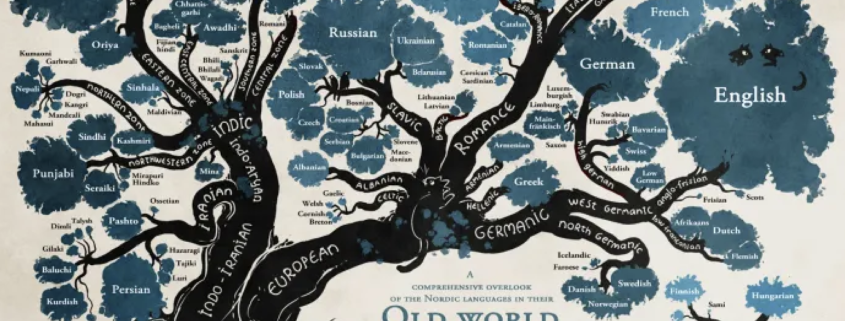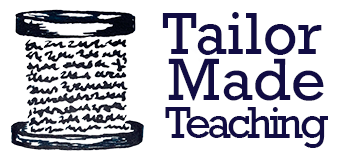
Why is English a global language? The answer is a complicated one to do with power and politics and the way the language itself works. The history of Britain is a history of invasion and settlement in Britain before Britain invaded other countries around the world. English has a unique ability to adapt and change, ‘borrowing’ words from all languages. Do you know any words in English that sound like your own language?
Celtic Britain
Before the arrival of the Anglo-Saxons, Britain was home to various Celtic communities speaking Scottish Gaelic, Old Welsh and Old Cornish. Some Celtic words survive in English especially in place names. Common words in English derived from Celtic languages include:
Glen: meaning a narrow valley, from the Scots Gaelic ‘gleann’.
Crag: referring to a steep or rugged cliff, from the Welsh word ‘craig’.
Druid: the term for a member of the ancient Celtic priesthood, from the Old Welsh word ‘derwyddon’ or the Old Irish word ‘drui’.
Plaid: a patterned cloth used in traditional Scottish dress, from the Scots Gaelic word ‘plaide’.
Bard: meaning poet and storyteller, from the Old Welsh word ‘bardd’.
Whiskey: the word for the alcoholic drink from the Scots Gaelic word’ uisce breatha’ meaning ‘water of life’.
Cauldron: a large metal pot, from the Old Irish word ‘coire’.
Anglo-Saxon Roots (5th to 11th centuries)
Germanic tribes (the Angles, the Saxons, and the Jutes) began to settle in England around the 5th century. Anglo-Saxon, or Old English, had a much more complex grammatical structure than modern English and a more flexible word order, because it used inflections to convey grammatical relationships. Anglo-Saxon is barely recognisable as English.
Anglo-Saxon: Þæt wæs god cyning.
Modern English: That was a good king.
There are only about 4,500 words from Anglo-Saxon which are currently used in English but because they are mainly words for everyday things we use them a lot:
Sun: from the word ‘sunne’.
Hound: from the word ‘hund’ meaning dog.
Head: from the word ‘heafod’.
Home: from ‘hām’
Friend: from ‘frēond’
Book: from ‘bōc’
Night: from ‘niht’
Sleep: from ‘slǣpan’
Time: from ‘tīma’
Water: from ‘wæter’
Tuesday, Wednesday and Friday are named after Anglo-Saxon gods.
Christian Missionaries and Latin Influence (6th to 11th centuries)
Christianity brought with it many words from Latin including:
Bishop: from the Latin ‘episcopus’
Martyr: from the word for ‘witness’
Font: from ‘fons’ or ‘fontis’ meaning ‘source’ or ‘fountain’.
Viking Invaders and Old Norse Influence (8th to 11th centuries)
The Vikings from Scandinavia raided and then settled in Britain from the 8th century leaving words in English such as:
Sky: meaning cloud
Take: take
Give: give
Ransack: a combination of the words ‘rann’ (house) and ‘saka’ (search).
Anger: from ‘angr’
Cake: from ‘kaka’
Sick: from ‘sikr’
Want: from ‘vanta’
Die: from ‘deyja’.
It’s estimated that around 1,500 to 2,000 words in modern English have Old Norse roots.
The Norman Conquest and the Influence of French (11th to 15th centuries)
In 1066 William the Conqueror invaded England from France and defeated King Harold to become King. French became the language of the rich and powerful. About 10,000 new words entered the English language, a lot of them as synonyms for words we already had.
Beef: from ‘boeuf’
Pork: from ‘porc’
Government: from ‘governer’
Justice: from ‘justise’
Castle: from ‘castel’
Reward: from ‘rewarder’
Payment: from ‘paiement’
Challenge: from ‘chalenge’
Adventure: from ‘aventure’
Poison: from ‘poison’
The Renaissance and Latin Influence (14th to 17th centuries)
During this period there was a resurgence of interest in classical learning and Latin influenced English vocabulary particularly in the sciences:
Biology: from the Latin word ‘biologia’, which is a combination of two Greek words ‘bios’ meaning ‘life’ and ‘logia’ meaning ‘study’ or ‘knowledge’.
Abstract: from the word ‘abstractus’ meaning ‘drawn away’.
Illuminate: from the word ‘illuminare’ meaning ‘to light up’.
Reveal: from ‘revelare’, meaning ‘to unveil’.
Celestial: from ‘caelestis’, meaning ‘heavenly’.
Discipline: from ‘disciplina’, meaning ‘instruction’ or ‘knowledge’.
Legitimate: from ‘legitimatus’, meaning ‘lawful’.
Global Expansion and Colonial Influences (17th to 20th centuries)
With the British Empire English spread across the globe and absorbed words from various cultures:
Jungle: from the Hindi word जंगल” (pronounced “jangal”)
Kangaroo: from the Australian Aboriginal word ‘gangurru’
Chocolate: from the Aztec word ‘xocolātl’.
Bizarre: from the French word meaning ‘odd’ or ‘peculiar’.
Piano: from the Italian word meaning ‘soft’ or ‘quiet’.
Alcohol: from the Arabic word ‘al-kuḥl’.
Paradise: from the old Persian word ‘pairidaēza’, meaning ‘walled garden’.
Amok: from the Malay word ‘amuk’, describing a violent attack.
Tobacco: from the Native American word ‘tabako’.
This is when English was spread around the world and different Englishes began to be developed such as American English, Australian English, Indian English, all of which have their own Standards.
Modern English and Globalisation (20th century to present)
Global communication in the modern age has resulted in a huge number of loanwords (words from other languages) entering English.
Pizza: from Italian
Karaoke: from Japanese
Entrepreneur: from French
Graffiti: from Italian
Safari: from the Swahili word for ‘journey’.
Robot: from Czech
What I really like about English is its ability to change, to adopt new words, to adapt its grammar over time. I like that people from Oxford, England, to the Australian outback, to the American deep south, to the Indian subcontinent can be both united and distinguished by the same language. Although English was often spread through conflict and oppression (both in England and abroad) it feels to me like the language itself is democratic and egalitarian, influenced by all. It has weathered centuries of change and bridged diverse cultures and communities worldwide
Have a look at the (very fast) ‘History of English in 10 minutes’:


